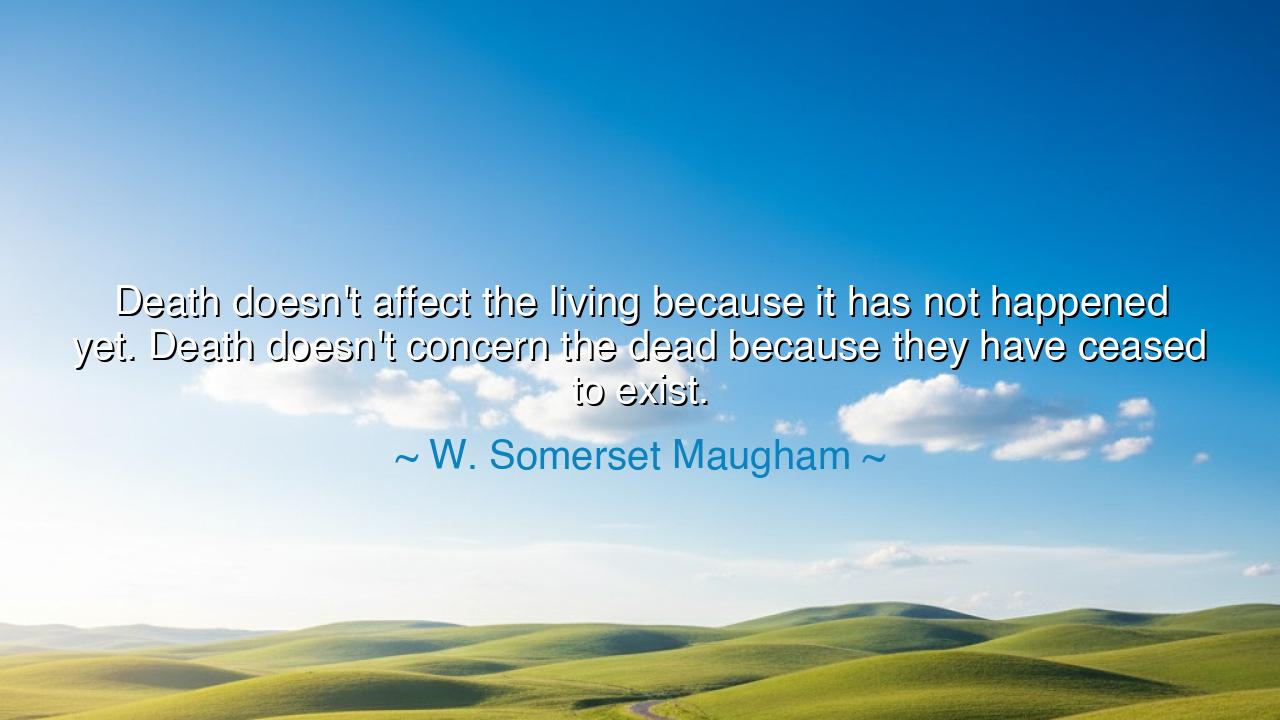
Death doesn't affect the living because it has not happened yet.
Death doesn't affect the living because it has not happened yet. Death doesn't concern the dead because they have ceased to exist.






“Death doesn’t affect the living because it has not happened yet. Death doesn’t concern the dead because they have ceased to exist.” Thus wrote W. Somerset Maugham, the English author whose clear, incisive mind saw through the veils of human fear and folly. His words, though simple in their logic, carry the gravity of ages — the kind of truth that philosophers have wrestled with since the dawn of thought. In this reflection, Maugham captures the paradox of death: that it is both inevitable and yet powerless over us. For while we live, death is not here; and when death comes, we are no longer there to feel its touch. It is the shadow that follows us, yet never meets us face to face.
The origin of this insight lies deep within the philosophical tradition that stretches back to the ancients. Maugham echoes the voice of Epicurus, the Greek sage who taught that death should not be feared, for “when we exist, death is not present, and when death is present, we no longer exist.” Epicurus sought to free humankind from the tyranny of imagined suffering — the dread that poisons life with visions of the inevitable end. Maugham, centuries later, renewed that ancient wisdom, shaping it in the language of modern reason. His quote is not a denial of mortality, but a liberation from it. It reminds us that death is a phantom enemy, feared only because the mind allows it to live before its time.
To understand this truth fully is to understand freedom — the freedom of the soul from the chains of unnecessary fear. Maugham’s statement invites us to see that life and death never coexist. We cannot experience our own death, only the thought of it, and that thought is the source of our suffering. The fear of death steals the vitality of living; it makes the living half-dead while they still breathe. The wise, however, turn their gaze from the inevitable to the immediate — they live not in the shadow of the end, but in the light of the moment. As the Stoic Marcus Aurelius once wrote, “It is not death that a man should fear, but he should fear never beginning to live.”
Consider the life of Socrates, who faced his execution with calm serenity. When his students wept, he told them that death was either a peaceful sleep or a journey to meet those who had gone before — and in either case, there was no cause for terror. He drank the hemlock without trembling, for he had long understood the lesson Maugham later articulated: that death is not our adversary, but our completion. Socrates’ final hours were not filled with dread, but with conversation and laughter. His peace came not from faith in immortality, but from wisdom — from knowing that what ends is not ruined, only concluded.
Maugham’s insight is, in essence, a reminder to reclaim life from the fear of loss. When we spend our days in anxiety about what will one day come, we miss the miracle that is already here. The breath, the light, the laughter — these are fleeting, yes, but that is what gives them worth. To live as though every hour were borrowed is not to despair, but to awaken. The wise do not fear the silence that follows life; they cherish the music that precedes it. Death, in this sense, is not a thief — it is the closing note of the song, made beautiful because it must end.
There is also humility in this teaching. Maugham, who observed the human condition with both wit and melancholy, reminds us that death is the great equalizer, indifferent to wealth, power, or pride. To live in constant fear of it is to fight against the order of the universe itself. The river does not grieve when it flows into the sea; the flame does not curse the wind that ends its burning. So too should we accept that all things rise and fall in their appointed time. Life’s purpose, then, is not to outlast death, but to outshine it — to fill the brief span between birth and silence with meaning, kindness, and joy.
So, my listener, take this wisdom to heart: do not fear what is certain, and do not mourn what has not yet come. Death will find you when it is time, and when it does, you will no longer care. Until then, live fully, without hesitation. Speak words of love, pursue your calling, forgive, create, explore, and rest — for these are the things that belong to the living. The fear of death robs no one but the fearful; the courage to live blesses all who encounter it. As W. Somerset Maugham reminds us, death neither troubles the living nor touches the dead — it is life, vibrant and fleeting, that demands our reverence. To live unafraid is to live completely — and that, in the end, is the greatest victory over death itself.






AAdministratorAdministrator
Welcome, honored guests. Please leave a comment, we will respond soon